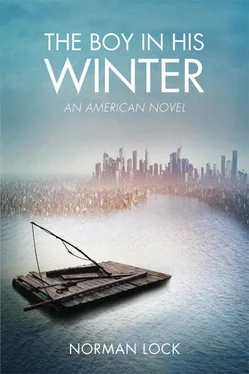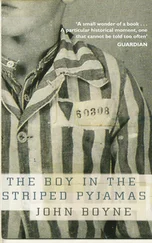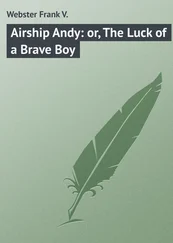You want to know where this is leading.
I may not have escaped Huckleberry Finn. You’ve heard of people unusually amenable to suggestion, who are regressed by hypnosis to other, earlier lives, as if the self were an archaeological record of personalities that disappeared without a trace until — by patience and exertion — they are, one by one, unearthed. Huck may be waiting underneath Albert Barthelemy for the final call to bring him, smartly, forward. Huck’s personality may be the stronger and, in the end, may have power to overthrow my own. Perhaps Huck can better endure eternity, or the grave. Should I send for a hypnotist to release him, the way devout Catholics do a priest to daub their brows with the olive oil of Extreme Unction? Ought I go into eternity as Albert Barthelemy — or will I stand a better chance as Huck, who was less fastidious and scrupulous than I have become at the close of my days? And what if there is a still deeper antecedent self beneath us both, whose name might be Mark Twain? Had I tried to outrun the past, and failed?
I woke, feeling anxious and afraid. The king seemed not to know me. At breakfast, he was curt and, when I called him Juan, rebuked me for an insolent disregard of etiquette. After his toast had been reduced to crumbs and his coffee to its lees, he stood — on his dignity — and left without another word, allowing me to consider what was due a king. The steward reassured me, saying that his majesty often became sullen when he remembered the race of Spanish bulls, now sadly extinct. At Rotterdam, the Canción docked with an undignified bump against the pier. I rented a bicycle and pedaled the twenty-one kilometers to Papendrecht.
I MET JAMESON — BY ACCIDENT — at the Golden House in Papendrecht, where Willem and I had gone to eat dim sum. She was by herself at a table placed beneath a painting of the Yangtze River, elegantly conducting with chopsticks an orchestra of dumplings on her plate. Willem asked if we could join her. She smiled agreeably, and when two additional places had been set, we sat. Bashful for a reason I could not explain, I fiddled with a spoon while Willem introduced us to each other:
“Jameson Tarn. . Albert Barthelemy.”
“How do you do,” she said, her eyes sounding mine, which slid away to a calendar by the kitchen door. I read the date, as if to steady myself in time: August 15, 2034.
Willem nudged my ankle with his shoe. I turned my face to hers and stammered, “Glad to meet you.” And I was! As absurd as it must seem, I was pleased to meet this lovely black woman with a frankly penetrating gaze that searched for something in my eyes throughout the meal.
All right! It’s far-fetched, but I believed from the first instant I saw her that she was Jim. No, that’s too disturbing an idea! Let’s say instead that I believed Jim had entered her. That’s not exactly right, either. I believed Jim had been infused in her, the way tea leaves are in boiling water, to become what is neither one nor the other, but something tonic and strengthening. In other words, Jameson — by an unimaginable transubstantiation — had acquired a vital aspect of Jim, who meant to look after me in death as he had in life. He may have fallen in with the egun, spirits of the dead for the Yorùbáns, who believe the border between the spiritual and physical life is porous. Fortunately for my readers (to speak optimistically), in 2077 I can talk of numinous states without fear of ridicule. In previous ages dominated by a vulgar materialism, I could not have told this story. (I’d have had to tell some other to explain my life.) But I want my readers to understand that when I fell in love with Jameson and she with me, there was nothing unnatural in our feelings.
“You have an unusual first name,” I said later, when we were walking along the Merwede.
“My father named me after his favorite whiskey,” Jameson said, and laughed.
“Willem said you were stranded.”
“I am, although Holland is a lovely country to be stranded in. I chartered a cruiser at Rotterdam and planned to travel the Merwede to the river Waal, then on to the Rhine. But at Papendrecht, the captain took sick. His appendix burst, poor man. He’s in the hospital. I’m thinking seriously of giving up and going home.”
“I have my captain’s license,” I said, and, noticing her doubtful glance, added, “I’ve spent more years on the river than you’d think to look at me.”
There are no coincidences, Tom Sawyer whispered in my mind to bedevil me.
“You have time?” she asked.
“As much as you need.”
Time, for me then, seemed all but inexhaustible.
We walked in silence along the river — she looking thoughtfully at the water, I shyly at her face in profile, which stirred in me memories of other elegant lines, like a heron’s in flight or the prow of a riverboat in the charged instant before getting under way. I suppose I was thinking of a quality as elusive as beauty; I mean expectancy. Isn’t it marvelous how, with the speed of light, we can be recalled from the present to a commensurate moment in the past? And just so did Jameson and I arrive at a band shell on the riverbank — empty and silent now, but able to unearth an evening buried long ago when Tom Sawyer, Jim, and I stood by another river and heard a brass band playing military marches that had incited men to fall at Austerlitz and, on our own shores, at Dearborn and Detroit, on ground made noble, or ignoble, by death.
“People have been kind,” said Jameson, her eyes resting on mine, which this time didn’t flinch from hers. “Even here: Willem and now you. It’s enough to make me believe in providence.”
“Or accident,” I said, feeling obliged, again, to resist the tyrannical persuasion of fate. (As if it matters to the body mangled in a car wreck whether the fault lies with fate, accident, or a moment’s inattention!)
Earlier, I mentioned that something had changed me: an accident I had no earthly reason to expect. Do you have the passage? Yes? Let me see it. I was changed, too, by something that I will insist, always, was accidental: an instant of senselessness and absurdity when I fulfilled the river’s purpose and my own. I was talking about Jameson and the impetuous moment on the Merwede when I offered myself as captain and she just as impulsively accepted.
IN SANTA MONICA, WHERE JAMESON wrote and illustrated children’s stories, she’d had the happy thought of turning a pilgrimage to the German town of Münchhausen into a picture book. An eighteenth-century baron by that name is famous for his fantastic tales and became himself the subject of improbable narratives like Marvelous Travels on Water and Land: Campaigns and Comical Adventures of the Baron of Münchhausen . She’d planned to follow the Merwede’s more or less easterly progress to the Waal, then on to the southerly tending Rhine. Below Koblenz, she’d travel the Lahn, a tributary of the Rhine, northeasterly to the Wetschaft valley and the town of Münchhausen. It was not until she hired a boat and captain in Rotterdam that she understood her intended journey’s impracticability. (With its feints and twists, the river system seemed a folly to me, who was used to the frank ways of the Mississippi.) The captain soon persuaded Jameson to forgo a trip to Münchhausen in favor of the Middle Rhine and its castles.
“It was a disappointment!” she said to me. “Still, there’s no reason why I can’t honor the baron with a marvelous travel story of my own.”
She’d turned the smaller stateroom into a studio, where I discovered pencil sketches she had done between Rotterdam and Papendrecht. She had a gift for capturing, in barest summary, small moments that promised larger things. Her line was confident; her shading conveyed an absence made mysterious by an almost-glimpsed presence. She’d brought a number of her published books. One in particular, about a boy and a giraffe named Rupert, moved me by its unchildish refusal of sentimentality. It began: From autumn until spring, I left the attic just once — to go to Africa with Rupert, my friend. There was a war. Smoke darkened the sky. At night, it covered the moon. We were afraid. The attic belonged to a man who made shoes.
Читать дальше












